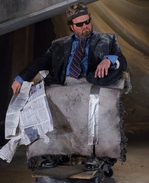SITE GUIDE
SEARCH
REVIEWS
REVIEW ARCHIVES
ADVERTISING AT CURTAINUP
FEATURES
NEWS
Etcetera and
Short Term Listings
LISTINGS
Broadway
Off-Broadway
NYC Restaurants
BOOKS and CDs
OTHER PLACES
Berkshires
London
California
New Jersey
DC
Philadelphia
Elsewhere
QUOTES
TKTS
PLAYWRIGHTS' ALBUMS
LETTERS TO EDITOR
FILM
LINKS
MISCELLANEOUS
Free Updates
Masthead
A CurtainUp Review
Endgame
|
"The act of existing is a striving as pathetic as it is comic. "— Kierkegaard
|

Scott Greer as Hamm, Credit Mark Garvin.jpg
(Photo credit: Mark Garvin) |
The characters, trapped by circumstance and physical limitations, are emotionally tethered to each other by bonds that we, and maybe they, only partially understand. There's Hamm (Scott Greer), a large and domineering blind man who can't walk; Clov (James Ijames) his servant/caregiver, who can't sit; and Nagg (Dan Kern) and Nell (Nancy Boykin), his parents, who have been relegated to ashcans (in this case a chemical drum and a 55 gal drum). All await the end, the finish. Hamm complains, "Why this farce day after day?"
Beckett wrote from a place of introspection, and his take was essentially that there is nothing to express, and it's the artist's obligation to express it. The late critic and scholar Martin Esslin believed that for the audience Beckett's work is about the experience of being there and being affected, not by what is said, not by social issues, but by the quality of the experience of being that's communicated.
The expectation may be that this theatrical experience will be austere and economical, but the enormous influence of the sad, off-kilter set and the effect of the rich acting bring out more facets than Samuel Beckett would ever have approved. No doubt his ghost has already walked out on the show and in some spectral court pressed charges against the theater for trampling on the playwright's prerogative.
Although by all accounts the writer couldn't tolerate his work being reduced to a message by having meaning applied to it, this audience gets a helping hand determining meaning. Beckett-admiring director Edward Sobel makes surprisingly divergent choices, finding a pragmatic path through the absurd, elusive play, lending a whiff of William James along with the expected James Joyce.
Actors wring meaning from every syllable in most un-Beckett-like fashion. Scott Greer, brilliant in the lead role of Hamm, compels attention through the force of his mindful acting, particularly when Hamm achieves the dawning of regret. Kerns and Boykin as Hamm's parents are vividly comprehensible despite their pitiful and ridiculous situation. James Ijames, as Clov, the only one who can move about, is not quite in sync with the other actors. Operating on a plane of abstraction where style trumps substance, he seems almost inadvertently to take a more typical approach to the absurdist work.
Less ambiguous than the writer intended, the production's articulated set and Sobel's divergent reading do not ruin the evening's entertainment. But it's a different take on the play. This Endgame pops with life. Not happy life, of course, but life marked by resignation and a kind of dignity. Yet here futility is shot through with a ray of hope. You may never have thought of Endgame as a hopey-changey thing, but the hint of change hanging in the dusty air of this particular production dangles the possibility of escape in the midst of existential despair. You could say the director is taking these characters on a walk down the garden path, for no one gets a pass out of this play.
Not just any old playwright's work gets the tribute of multiple directors' versions, the way Shakespeare, Beckett, and the best playwrights of all time do. It is the work of huge artists that is continually re-imagined, re-examined, and relocated. Understandably, the playwright's ghost might be irate about the Arden production. But time moves on, and maybe it's ok if it's good theatre but not strictly speaking good Beckett. Maybe it's time to re-imagine Endgame whether Beckett would approve or not.
|
Endgame>by Samuel Beckett
Directed by Edward Sobel Cast: Scott Greer, James Ijames, Dan Kern, Nancy Boykin Set Design: Kevin Depinet Lighting Design: Thom Weaver Sound Design: Daniel Perelstein Costume Design: Millie Hiibel Jan 17 – Mar 10, 2013 80 minutes Reviewed by Kathryn Osenlund based on 02/16 performance at the Arden Theatre, Arcadia Stage. |
|
REVIEW FEEDBACK Highlight one of the responses below and click "copy" or"CTRL+C"
Paste the highlighted text into the subject line (CTRL+ V): Feel free to add detailed comments in the body of the email. . .also the names and emails of any friends to whom you'd like us to forward a copy of this review. Visit Curtainup's Blog Annex For a feed to reviews and features as they are posted add http://curtainupnewlinks.blogspot.com to your reader Curtainup at Facebook . . . Curtainup at Twitter Subscribe to our FREE email updates: E-mail: esommer@curtainup.comesommer@curtainup.com put SUBSCRIBE CURTAINUP EMAIL UPDATE in the subject line and your full name and email address in the body of the message. If you can spare a minute, tell us how you came to CurtainUp and from what part of the country. |

Slings & Arrows- view 1st episode free
 Anything Goes Cast Recording
Anything Goes Cast RecordingOur review of the show
 Book of Mormon -CD
Book of Mormon -CDOur review of the show

